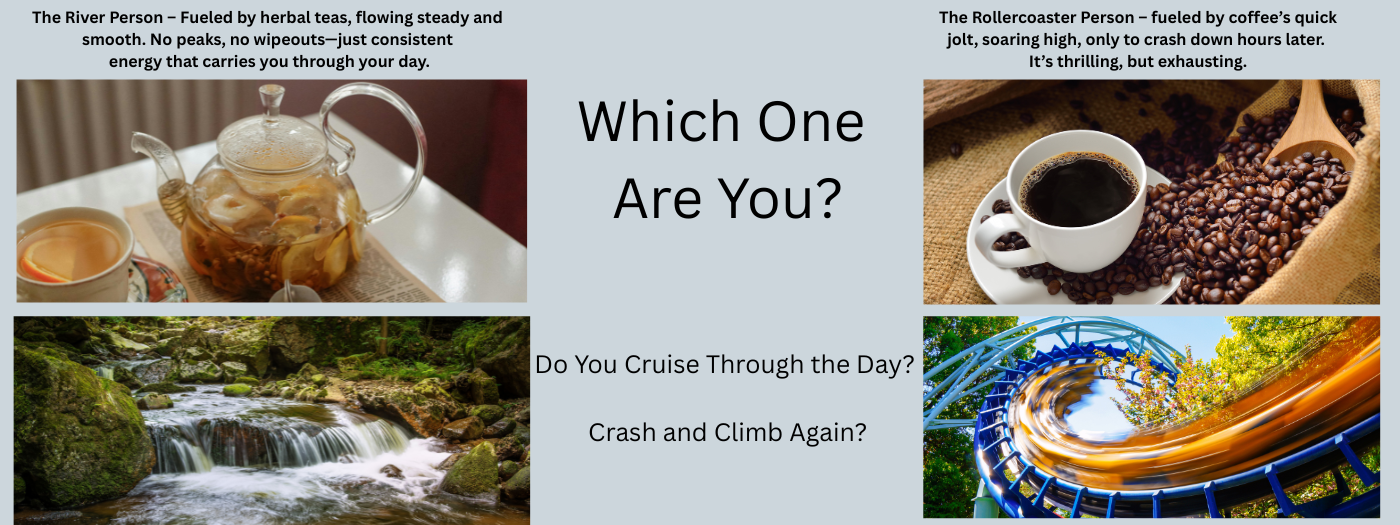The Rollercoaster vs. the River You know the drill: you down a hot cup of coffee, and within minutes you’re unstoppable. Emails fly, chores get conquered, the world is yours. Then—bam. Two hours later, you’re tired, irritable, and eyeing the coffee pot for round two (or three). That’s the coffee rollercoaster. Herbal teas, on the other hand, are more like a steady river—calm, nourishing, and consistent. They don’t throw you into overdrive and then dump you flat. They carry you smoothly through the day. So which one really sustains your energy—coffee or herbal teas? Let’s dig in. Pros: Instant energy boost Familiar ritual we all know and love Antioxidant-rich Cons: The dreaded crash (and repeat cycle) Jitters, racing heart, anxiety Sleep disruption (even if you drink it at 2 p.m.) Can upset digestion, raise acidity Coffee isn’t evil—it’s just a sprinter, not a marathon runner. Pros: Steady, nourishing energy (adaptogens build, they don’t burn) Gentle on digestion (many soothe the gut) Immune, mood, and stress benefits—beyond just energy Hydrating, not dehydrating Cons: Slower effects (no rocket launch) Best when used consistently Some blends taste “herbal” (translation: earthy) Herbal teas don’t smack you awake—they invite your body to function the way it’s meant to. Ginseng improves stamina and reduces fatigue (PubMed PMID: 15982990). Rhodiola reduces stress-related fatigue, supports mental performance (PMID: 11081987). Eleuthero boosts endurance and recovery (PubMed PMID: 24715053). Coffee = hot, yang, stimulating—great short-term, but burns out yin (your reserves). Herbal teas = balance of yin and yang, nourishing qi, blood, and fluids so you don’t run on empty. West: Coffee is the morning fuel. Quick, strong, brash. East: Tea is the cultural anchor. Gentle, layered, sustaining. Both cultures got it right—but tea lasts longer. You crash hard at 2 p.m. You wake up at 3 a.m. wired Your stomach feels acidic after coffee You need 3+ cups just to “function” If you nodded at 2 or more, it might be time to try herbal support. Ginseng Tea (Ren Shen) – Classic vitality booster. Think “fuel for focus.” Eleuthero Root Tea – Gentle, sustaining. Nicknamed “Siberian ginseng.” Rhodiola Tea – Mental clarity + stress reduction. Great for busy brains. Licorice Root Tea (Gan Cao) – Naturally sweet, harmonizes other herbs, supports digestion. Energizing Ginseng & Licorice Tea 5 g sliced ginseng root 2 g licorice root Simmer in 2 cups water for 15 minutes Sip warm in the morning Steady energy, no crash required. Swap your second cup first – Start small. Morning adaptogens – Use ginseng or eleuthero instead of that second espresso. Reduce gradually – Cut coffee by 25% every few days. Hydrate + evening tea – Replace late coffee with calming teas like jujube seed. Check after 2 weeks – Most people notice steadier energy, calmer mood, and better sleep. Q: Can herbal tea really replace my morning coffee? Q: What’s the best herbal tea for energy? Q: Do herbs cause side effects? Coffee wakes you up. Herbs keep you awake. If you’re tired of riding the caffeine rollercoaster, herbal teas offer a calmer, wiser path to true energy. Try one swap this week and see how your body responds. Panax ginseng and cognitive performance: PubMed (PMID: 15982990) Rhodiola rosea SHR-5 and stress fatigue: PubMed (PMID: 11081987) Adaptogens overview: PubMed (PMID: 19188053) Eleuthero and endurance: PubMed (PMID: 24715053) A clinical study found that 200 mg of standardized Panax ginseng significantly improved performance on mental tasks and noticeably reduced subjective feelings of mental fatigue during sustained cognitive activity. PubMed+1PubMed A broader review highlights ginseng’s role as a traditional tonic and adaptogen, contributing to vitality, CNS (central nervous system) support, and overall homeostasis. NCBI A randomized, double‑blind, placebo‑controlled study using the SHR‑5 extract of Rhodiola rosea showed effective reduction in stress‑induced fatigue and improvements in cognitive functions such as associative thinking, memory, concentration, and perception speed. PubMed+15PubMed+15PubMed+15 Clinical trials overall suggest that SHR‑5 may enhance mental performance and attention, helping prevent exhaustion in fatigued individuals. PMC Adaptogens like Eleutherococcus senticosus and Schisandra chinensis have been documented to increase endurance and mental performance in people experiencing mild fatigue. PubMed+15PubMed+15PMC+15 Adaptogens in general have been shown to support resistance to stress, as well as boost concentration, performance, and endurance in states of fatigue. PubMedHerbal Teas vs. Coffee: Which Sustains Your Energy?

Coffee vs. Herbal Tea at a Glance
Feature
Coffee (a wild ride)
Herbal Tea (steady river)
Energy Type
Spike + crash
Gentle, balanced
Caffeine
High (≈95 mg/cup)
Low to none
Crash Factor
Common
Rare
Sleep Impact
Can disrupt
Usually supportive
Digestive Impact
Can irritate
Often soothing
Extra Benefits
Antioxidants
Adaptogens, calming, immune
Why Coffee Feels Great… Until It Doesn’t
Why Herbal Teas Win the Long Game
The Science (and TCM Wisdom) Behind Herbs
From Science
From Traditional Chinese Medicine
The World’s Energy Choices
Signs Coffee May Not Be Working for You
Top Herbal Teas for Steady Energy
➝ [Shop Ginseng]
➝ [Shop Eleuthero]
➝ [Shop Rhodiola]
➝ [Shop Licorice]
Quick Recipe Box
How to Transition from Coffee to Herbs
FAQ
A: For many, yes. It won’t be the same rocket launch, but it provides steadier clarity without the crash.
A: Ginseng and eleuthero for stamina, rhodiola for mental focus.
A: Generally gentle, but always check for interactions if you’re on medication.
Final Thought
Research & References
This content is for educational purposes only. These statements have not been evaluated by the FDA. Products are not intended to diagnose, treat, cure, or prevent any disease. Consult a qualified healthcare professional regarding your individual needs.
Ginseng & Mental Energy
2. Rhodiola rosea & Fatigue / Mental Performance
3. Adaptogens, Including Eleuthero & Schisandra
Summary Table of Scientific Findings
Herb / Extract
Documented Benefits
Panax ginseng
Enhances cognitive performance; reduces mental fatigue; adaptogenic tonic. PMC
Rhodiola rosea (SHR-5)
Reduces stress-induced fatigue; supports memory, attention, and mental performance. PubMedPMC
Eleuthero / Schisandra
Increases endurance and mental performance; supports stress adaptation. PubMed+1

